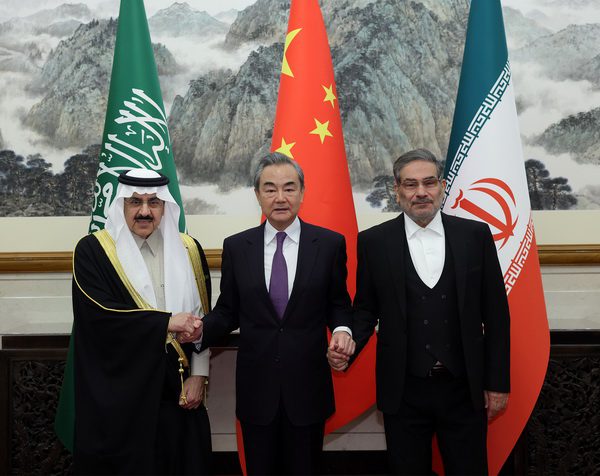Xi marks third term as President of China securing his position as one of the most powerful leaders in history. Meanwhile, China’s efforts to mediate peace talks between Saudi Arabia and Iran were successful as both countries agree to restore ties.
On 10th March 2023, Chinese President Xi Jinping at Beijing’s Great Hall of the People received the formal endorsement of continuing his third term as the leader. He received a standing ovation after receiving 2,952 unanimous votes.
Given that his reappointment was announced last fall, this came as a formality, but it is nonetheless an incredible accomplishment. It bolsters his authority and secures his position as the most powerful state leader of communist China since Mao Zedong.
Almost half of the 26 officials appointed to the cabinet have been in the position since 2021 or earlier. (Data compiled by Bloomberg News). The only two new bureaucrats introduced over the weekend at the National People’s Congress were Li Shangfu, the defense minister, and Zheng Shanjie, head of the economic planning agency.
On the same day (10th March 2023), China’s efforts to mediate a conversation to mend ties between Saudi Arabia and Iran were successful. Yet, before this revelation, nothing was known about China’s role as a facilitator in resolving protracted disputes between the two nations.
Soon after, pictures surfaced of the Secretary of the Supreme National Security Council of Iran shaking hands with Saudi National Security Advisor, Musaad bin Mohammed al-Aiban, with Wang Yi, China’s Foreign Minister standing in the middle.
Wang reportedly said China continues to play its part as a host in handling geo-political issues and take responsibility as a nation for any help it can offer with the current situation. As a “good-faith” and “reliable” mediator, China has fulfilled its duties as a host for dialogue, Wang further added.
Relations between the two countries have been severed since 2006 when there was a conflict between Israel and the Lebanese militant group Hezbollah, which was supported by Iran and led Saudi Arabia to believe that Tehran is forging new partnerships that would be detrimental to Saudi interests. Furthermore, in 2016, after protestors stormed its embassy in Tehran in response to Riyadh’s killing of a prominent Shia Muslim Cleric, Saudi Arabia cut ties and closed down its embassy.
Iran has also supported Shia Houthi rebels who forced out the Saudi-backed government in 2014, while Saudi Arabia has led a devastating air campaign against the Houthis since the following year.
However, with the recent peace talks, the joint statement calls for the re-establishing of ties and the reopening of embassies to happen “within a maximum period of two months.”
They also plan to reimplement a security pact signed 22 years ago under which both parties agreed to cooperate on terrorism, drug-smuggling and money-laundering, as well as reviving a trade and technology deal from 1998.
“This brokered deal comes as evidence that China is growing its presence and showing increased interest in playing a role in the region,” Robert Mogielnicki, senior resident scholar at the Arab Gulf State Institute in Washington, DC, told Al Jazeera.
The fact that it has been agreed to in Beijing is very significant for China and its rise as a diplomatic and strategic player in the Gulf region,” said Hussein Ibish, a senior resident scholar at the Arab Gulf States Institute in Washington.
With the recent developments, it appears that China has an advantage over the US diplomatically since it is adhering to its non-interference policy and continues to play a peacemaking role, in contrast to the US, which has been taking sides in increased regional disputes.




